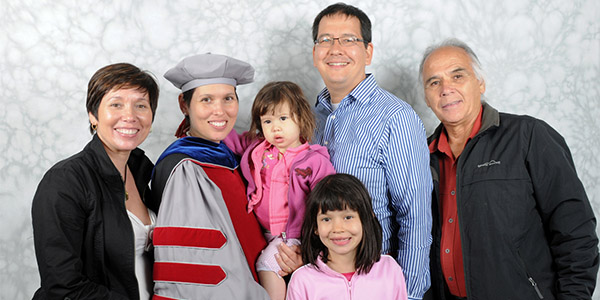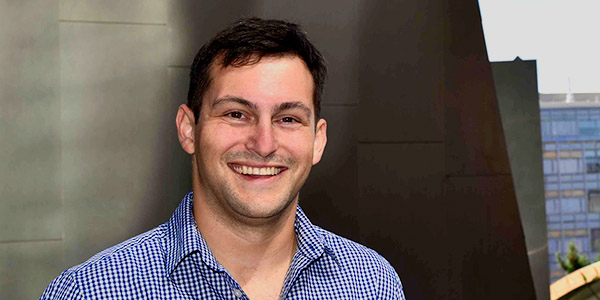COMMENCEMENT 2022
MIT SHASS Advanced Degree Ceremony | 26 May 2022

Candis Callison, CMS SM '02, HASTS PhD'10, and family at her Commencement celebration
Watch via Livestream
You are warmly invited to join us via Livesteam on Thursday, 26 May 2022 at 1:30pm to celebrate our Masters and Doctoral graduates.
Program
Follow the ceremony with a digital version of the program.
Graduates of all master’s and doctoral programs through the MIT School of Humanities, Arts, and Social Sciences (MIT SHASS) will be recognized during an in-person, school-specific ceremony taking place on Thursday, May 26, 2022. Guests—up to 4 per graduate—will be welcomed at these celebrations and hoods will be presented to doctoral candidates.
For more information or questions about the MIT SHASS advanced degree ceremony, please reach out to Natalia Nazarenko-Georgieva / natalian@mit.edu, the School Coordinator for the MIT SHASS 2022 Advanced Degree Ceremony. For all other questions regarding MIT Commencement ceremonies, please visit commencement.mit.edu.
Advanced Degree Ceremony
Date: Thursday, May 26, 2022
Location: Media Lab, 6th Floor E14-674 Multi Purpose Room
Time: 1:30pm-3:00pm
Graduates and Faculty: report to the Media Lab by 12:30pm.
Graduates and Faculty: 12:45pm, line up at the Media Lab, 6th Floor
Guests: 1:00pm, four (4) tickets per graduate
A ticket is required for all those ages three (3) and older.
Following the ceremony, a reception for all MIT SHASS graduates and their guests will take place at the Media Lab, 6th Floor Silverman Skyline/Winter Garden Room E14 SS-648 from 3:00pm-4:00pm. If you require any accommodation to participate in the ceremony or reception please inform natalian@mit.edu.

2022 MIT SHASS Advanced Degree Ceremony
Watch via Livestream
You are warmly invited to join us via Livesteam on Thursday, 26 May 2022 at 1:30pm to celebrate our Masters and Doctoral graduates.
Program
Follow the ceremony with a digital version of the program.
2022 Student Speaker | Advanced Degree Ceremony

Marc Aidinoff, PhD'22 (HASTS); photo by Maria Iacobo
Address to the Candidates
By Marc Aidinoff, PhD '22 (HASTS)
Chief of Staff, White House Office of Science and Technology Policy
I see many parents assembled here in the hopes of answering one question many of them have been trying, for years, to ask, “why did you do that?”
You had so much promise. Law school seemed wise. Maybe just getting a job. You came all the way to MIT to do that?
For many parents, it’s not a hostile question but a nervous one about their child embarking on something, by definition, distinct, to figure out a novel research question.
It is a question many of our undergrad students ask: why are you studying what your studying?
It’s also a question our advisors ask us, “why are you doing this?” though they mean it in confusion that we have gone down a rabbit hole that does not comport with the original plan. In this context it is asked, sometimes lovingly and sometimes with a note, of concern.
It’s actually the question our peers ask us most in program seminar, though in coded ways, “what is the thing you are actually trying to do?”
I remember my undergraduate advisor warning me that “a part of graduate school is extraordinarily lonely because you need to go figure something out that no one else has ever thought was important enough to devote multiple years of their life to figuring out.”
He told me “It is an isolating journey to burrow in so deeply to one question.”
I know I struggled to communicate with my civilian friends and family what I was doing every day as a graduate student. A tremendous amount of jargon, from far too many sub disciplines, became a necessary set of scaffolding for me to think my own thoughts. I really struggled without it.
Today, we reflect on why we did that this thing. Why we pursed an advanced degree from SHASS.
Let me give three distinct answers to why I did—in addition to the privilege of great robes.
First, I needed to understand how the American state worked.
History is, and has proven time and again, to be incredibly useful as an explanatory apparatus.
That is a self-evident claim—of course history explains. But historiography is what proved even more useful.
For humanists and social scientists, the critical problem is knowing where to look to explain historical change.
How, for example, did a thing called the New Deal happen in the United States? Was it about unions organizing or US intellectuals importing British ideas about Progressive reform? Did it rely on the haphazard nature of American pragmatism—a smattering of programs to see what worked—or the power of one Southern voting bloc to ensure an American racialized caste system remained in place.
Was the New Deal state actualized through cultural narratives of belonging—or IBM computer systems that could suddenly treat the population as data, each citizen identified with a social security. My favorite explanations of the New Deal is that it is a system of federal grants to states that hold together a distributed federal system by using grant dollars as a carrot and stick to ensure national compliance.
Four days after defending my dissertation in the HASTS program, I joined the Biden Administration. First as a senior advisor in the White House Office of Science and Technology Policy and then as chief of staff for that office. As the manager for a team of over 140 extraordinary civil servants, political appointees, and subject matter experts charged with of laying out and coordinating a progressive agenda for and through science and technology, I am glad I am a historian.
The New Deal historiography tells me where to look to make lasting change. I think a lot about the strings that are attached to federal money when working with the team to build national guardrails on AI systems that violate civil rights or to incentivize data collection about the next pandemic.
Historicizing technology has proved particularly valuable to me. STS teaches a recurring lesson that technology hides people, the human labor that makes technical systems function. The problem is not the autonomous vehicle deciding to hit 1 passenger or 5, but the rich social worlds in which that car exists.
As Leo Marx, the great MIT cultural historian who passed away earlier this year, warned, the way technology has been imagined “relieves the citizenry of onerous decision-making obligations and intensifies their gathering sense of political impotence.” A card-carrying humanist knows how find the people.
If you ask me why I am here I will also say, I stayed in graduate school because I was afraid.
During our time in graduate school, we have witnessed a global rise of fascism, a stunning inaction on climate change, and a pandemic that has killed 6.3 million people, including 1 million Americans. It was punctuated by mass shootings, collective outrage at the public murder of unarmed Black men and women, and totally unacceptable treatment of immigrants, including at MIT.
Graduate school was a place to learn new solidarities, so that the fear would not be paralyzing. That meant marching and teach ins. It meant recognizing the power of unions. An older generation passed down some important lessons
I found that this period of uncertainty foregrounded values. Suddenly the Department was having conversations about what we should be trying to preserve or to build? For me that meant making a case for the right to vote, the right to clean air, the right to freedom from state murder. It also meant preserving what mattered about the university: the right to think, to wonder at a complex and beautiful problem, to revel at beauty. It fell to us to vigorously protect and advance the university and the pursuit of knowledge.
Amidst all of these threats to American social life, I also found myself, my peers, and the MIT faculty fearful of the harms that we might cause, of the harms of our research and our ideas. Perhaps we have good reason to be fearful: historically, graduates from this ceremony have had a long track record of hubris to devastating consequences. Collectively we have grappled with some of the more unsavory legacies of MIT social science—from Francis Amasa Walker’s eugenics to Walt Rostow’s modernization theory.
A certain humility is in order. If I were giving commencement remarks at Stanford’s computer science department, I would likely give a treatise on hubris. But having left MIT, the thing that worries me so much about SHASS and the students coming out of SHASS is a paralyzing sense of fear—that the crises are too big to handle, that our tools are insufficient, that the computer scientists have all the real power. This sense of powerlessness can come from the faculty, a faculty I adore but who increasingly talk about themselves as objects of, not agents of, the university system.
I hope that our time in graduate school, especially during multiple intersecting crises, allowed us, as both introspective scholars and overlapping communities, to reflect on the world we are trying to build, and the values we are seeking to advance.
Which brings me to my last point: For many of us, we wrote pursed a PhD because we had to. This thing we are doing, at its best, can be a vocation. As teachers, as researchers, this scholarly way of being can be a calling. There are things I need to know.. The colleagues have been excellent. The mentors were wise. But I needed to figure something out—and I needed the community to do that work.
For those in this room for whom today is a reaffirmation of your vocation, let me make a plea. Do the work so others can stand where you are today. The University system is not on sure footing. Funding has disappeared. Jobs are limited. Scholarship has requires a faster turn around time for less ambitious research
All scholars in the humanities and social sciences will make compromises to prove their relevance and utility. But please stand up for the ability to pursue a research question for its own sake. Protect the privilege to wonder, to follow a strange nagging feeling that could lead to quite a lot of work and standing here today.
Congratulations!
________________________
Bio Note — Marc Aidinoff ’22 is a graduate of MIT’s Program in History, Anthropology, and Science, Technology, and Society (HASTS), which is based on the School of Humanities, Arts, and Social Sciences.
He is currently the Chief of Staff of the White House Office of Science and Technology Policy (OSTP) under the leadership of Dr. Alondra Nelson. There, he manages a cabinet-level agency with a mission to “maximize the benefits of science and technology to advance health, prosperity, security, environmental quality, and justice for all Americans.” Aidinoff coordinates efforts across divisions, including OSTP’s work on pandemic preparedness, algorithmic accountability, ending cancer as we know it, and clean indoor air.
At MIT, his dissertation, “A More Updated Union: New Liberals and their New Computers in the New South,” traced the computerization of the welfare state and the rise of new liberal politics. He argued that changes in technical systems enabled and enacted new expectations about what government could and should do. His research has been supported by the Jefferson Scholars Foundation, the Association of Centers for the Study of Congress, the Charles Babbage Institute, the Horowitz Foundation for Social Policy, the William P. Clements Jr. Center, and MIT’s Internet Policy Research Initiative (IPRI).
A committed teacher, Aidinoff has been recognized with MIT's Siegel Family Teaching Prize, Harvard’s Derek C. Bok Award for Excellence in Graduate Student Teaching, and, as a part of Freedom Summer Collegiate, the Manne Family Fellowship at the Rosedale Mississippi Freedom Project.
GradImages
Photo ordering information for the Class of 2022 will be mailed directly following the ceremonies from GradImages. Graduates will receive an email and a hard copy packet will be sent to the mailing address on file. Until 11:59 pm the day before the ceremony, you may pre-order graduation pictures to take advantage of a promo code for 20% off: visit GradImages online to view and purchase custom photo products like prints, plaques, and specialty gifts.
If have any questions or concerns regarding photos, please contact GradImages Customer Service at (800) 261-2576, online, or email ecc.giservice@gradimages.net.
Pre-registration/20% off link, live until 11:59 the night before.
SHASS Departmental Receptions
Graduates will be invited by their home departments for program-specific receptions.
Department of Economics
Date: Thursday, May 26, 2022
Time: 4:00pm-5:00pm
Location: Tent at Saxon Lawn
Contact: Julia Martyn-Shah/ Gary John King
Department of Political Science
Date: Thursday, May 26, 2022
Time: 3:30pm-5:00pm
Location: E53
Contact: Susan Twarog
Department of Linguistic & Philosophy
Date: Thursday, May 26, 2022
Time: 4:00pm
Location: Bldg 32-D 8th floor lounge; Stata Center
Contact: Jennifer Purdy
PhD program in History, Anthropology,
and Science, Technology and Society
Date: Friday, May 27, 2022
Time: 4:00pm-6:00pm
Location: Off-Campus Event by Invitation
Contact: Karen Gardner
For questions about the MIT SHASS Advanced Degree Department Receptions, Contact the Department Coordinators.
FAQs
Letter from Chancellor Melissa Nobles
Dear Students,
Despite the fact that Covid-19 continues to require our vigilance and flexibility, I write with a very hopeful message about Commencement as we turn the page on the second consecutive year in which the pandemic prevented MIT from hosting a traditional Commencement ceremony.
Here’s what you need to know:
- MIT will invite all graduating students and their guests to celebrate Commencement in person on Killian Court.
- While the time of the OneMIT Commencement Ceremony will be announced soon, the date – Friday, May 27, 2022 – is set.
- There are important format changes and new traditions for this year’s graduating class (and future classes).
I encourage all students to read on for more information.
Friday, May 27, 2022
New OneMIT Ceremony on Killian Court for all graduates
All Class of 2022 graduates and their guests will be invited to a 90-minute ceremony on Killian Court on the morning of Friday, May 27, featuring many capstone moments:
- The Academic Procession;
- President Reif’s Charge to the Graduates and the address by the to-be-announced Institute Commencement speaker; and
- The turning of the Brass Rat.
After the OneMIT ceremony concludes, graduates and guests will be invited to a luncheon reception; details will follow in the spring.
Friday, May 27, 2022
Bachelor’s degree ceremony
Following the luncheon reception, all graduating seniors will assemble on Briggs Field for a degree conferral ceremony. This celebration will be marked by the traditional reading of graduates' names, with photos taken as they cross the stage to receive their degrees.
Advanced degree ceremonies
Graduates of all master’s and doctoral programs will be recognized (and have their photos taken) during in-person school and college-specific ceremonies. Guests will be welcomed at these celebrations and hoods will be presented to doctoral candidates. Ceremony times and locations are expected to be released in January; for now, the schedule is as follows:
- School of Architecture and Planning: Thursday, May 26, 2022
- School of Engineering and Schwarzman College of Computing: Thursday, May 26, 2022
- School of Humanities, Arts, and Social Sciences: Thursday, May 26, 2022
- School of Science: Thursday, May 26, 2022
- Sloan School of Management: The school’s in-person ceremony schedule will be shared directly with its graduates.
Saturday, May 28, 2022
Celebrating the Class of 2020 and Class of 2021
As promised, we are inviting recent graduates back to campus so that we can recognize their accomplishments with the in-person, on-campus events and revelry that the pandemic postponed in 2020 and 2021.
You can learn more about the planning for all of these ceremonies in the graduate FAQ.
I sincerely hope that Covid-19 does not require adjustments to our Commencement plans, but it’s important to acknowledge that significant shifts in the public health landscape – like the one we wrote to the community about yesterday – could prompt us to pivot from our in-person celebrations. At this moment, we are carefully monitoring the situation and planning (and hoping) for the best in May 2022.
Please join me in setting our sights on a restful Winter Break, and a spring that will see us all gathered together again to give our graduates the wonderful send-off and celebration they deserve.